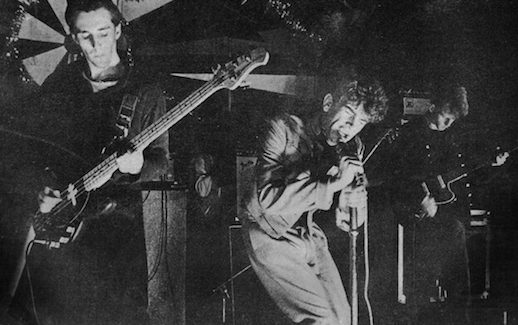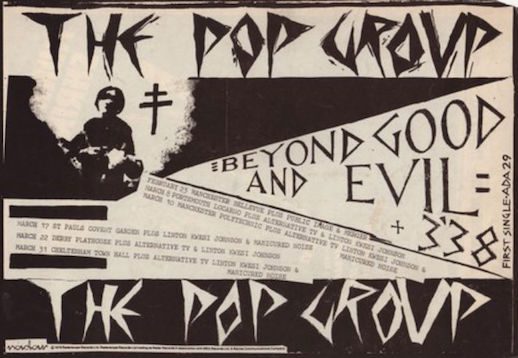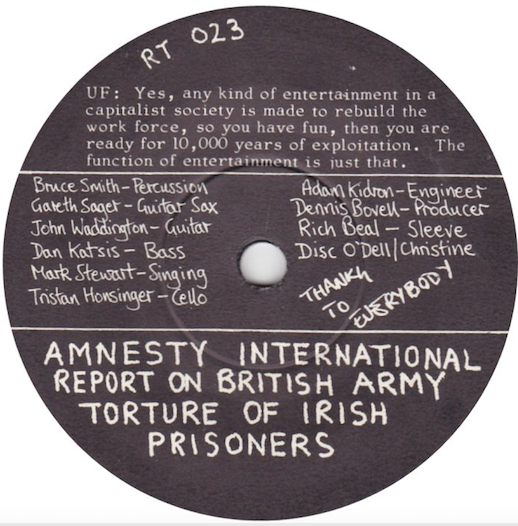
Jocund Din: Tim Dee on forty years of The Pop Group
“For how much longer can we tolerate mass murder?” It still seems to me extraordinary that it was possible to dance, as I did in the late 1970s, in front of a band of young musicians led by a lanky loudmouth howling these words into a microphone. I can’t remember the exact set but it might be that this particular crowd pleaser followed another called ‘We are all Prostitutes’ and came before one called ‘Blood Money’. I wasn’t waltzing, but my feet were certainly moving in time to the apocalypse being lit on the stage in front of me. I was sixteen. It was the most exciting music that I’d ever seen.
Mark Stewart, the same singer, now pushing sixty, could be heard the other day joking about a Pudsey Bear suit (the Children in Need mascot) with Marc Riley on BBC 6 Music, whilst his band, still The Pop Group and still (mostly) the same musicians as forty years ago, prepared to play three numbers in session from Honeymoon on Mars, their first record in decades (listen here). His voice was strong, and his singing voice is amazingly undimmed despite a life spent yelling. It had, though, more Bristol in it than I remembered.
Between 1978 and now (though mostly up until about 1984) I’ve often listened to him sing, but I am not sure I’ve heard Mark Stewart talk since we were at school together. He’s a little older than me, and doesn’t know me and didn’t then, but I have always thought that he, or one of his friends, scratched ha ha trendy, on the metal door of my locker, not long after I arrived in the Sixth Form at Bristol Grammar School. I’d taken advantage of laxer rules for older boys and had come back to start my A levels in black corduroy trousers. I was catching up but still was a little late to punk. His pants, if I remember right, were baggy but tight at the ankle; mine flapped.
The Pop Group, when they appeared only months later, already sounded on the far side, the Martian side, of all music that I knew, trendy or not. They hatched, as it were, on the wing, flying immediately, far beyond Bristol, far beyond boyhood, with sounds and concerns that seemed to bend the wider broken world towards them, even as they tore it apart and screamed about it, over and again in song after song. I knew Clifton; they seemed to know Cambodia. I didn’t think I was tolerating mass murder but I hadn’t much experience of it growing up in middle class Bristol; before I heard their record I hadn’t done much more than pull my sister’s hair a few times. But the way the Pop Group’s music first slashed at the available air in a song, and then Mark Stewart’s vocals used up all the rest of it, left you breathlessly implicated. And, even as they told you that Rome was burning, you were dancing, and that felt delicious and wicked at once. Your own newborn conscience was pricked. How could I turn away from these urgent bulletins? Tyranny bolstered my comfortable life; the H blocks were built on my behalf. There was Chile and Zimbabwe and strip searches and torture. But now they’d given me the news and, newly in the know, I could sing along and tap my feet too. My conscience eased. The call to arms – truth telling, protest, resistance, revolution – was both enacted and assuaged by this magnificent razoring noise.
As soon as I heard these exhilarating harangues I wanted to head in the band’s direction. There was chatter about them at school and three friends, from elsewhere, put me onto them: Mark, now lost to me, bought every Stiff single as they were released, ingested the NME every week, and knew everything about new music; Catherine, now a communications regulations expert for the BBC World Service, shared some of those half-dances; and Tom, my cousin, now a scholar of Venetian painting, played bass for the Glaxo Babies, also of Bristol, in the company of Dan Catsis, now a Pop Group staffer.
I bought She is Beyond Good and Evil, the first single, from Revolver records (sometime stamping ground of an overlord of this parish, Jeff B, and immortalised by Richard King in his excellent Original Rockers) and then, for a time, I hurried to get everything they recorded (some more singles and three albums: Y, For How Much Longer Do We Tolerate Mass Murder? and We Are Time). With Catherine, I went to see them play. I had a small blue garden gnome pinned to the lapel of my Oxfam dead man’s jacket by this point. And out of the same overcoat came Pere Ubu and the Last Poets, Captain Beefheart’s Lick My Decals Off, Baby, Albert Ayler’s sad parrots, the deep dug tenor trawls of John Coltrane, and some Shostakovich string quartets: they all nudged me along a certain line. I was becoming pretentious without knowing what I was pretending to. More corduroy, perhaps.
The Pop Group’s sounds were addressed to a world I barely knew about, but they came from a place that was home to me: an awkward nascent consciousness that had learned some of the dark truth of life even before I needed to earn a living or knew how to shave. Talking to Marc Riley, Mark Stewart mentioned Bruce Kent, the leader of the CND at the time of Protect and Survive, the government’s leaflet issued to British households with tips on how to endure a nuclear attack. The banal instructions for squaring up to Armageddon inspired Frankie Goes to Hollywood’s Two Tribes and E.P. Thompson’s masterful polemic Protest and Survive. Mark Stewart put on music for CND in Trafalgar Square. I organised a sponsored roller-skate ride from Bristol to Amsterdam that never came off.
Buying Honeymoon on Mars has sent me back to those three albums. The first, Y, is especially good for sounds, the second and third for words and world woe. All of them feel sculptural to me, both mineral and metal, hacked from the planet and beaten out of it, whilst the accompanying shouting – a work party of one, hitting the jackhammers and hollering – adds great momentum. To listen to such musical lean and heave is still oxygenating down all the years.
Y was produced by Dennis Bovell (he has a hand in the new record too) and exploits his dub mastery. Here, dub works as a kind of time-keeping and it cuts deeply into several tunes. For me, these are the great Pop Group numbers. The secret is dub’s delay and the echoic decay on that delay. The music and the words want to mimic a world falling apart but we’re spared sonic anarchy by the way the dub production encourages the songs to rhyme with themselves. Things cannot fully collapse if they make their shape, and then parry or answer that shape, and then moments later must start over again. The sound rolls around like thunder, a storm talking to itself, and dub gives the Pop Group a heart-beat. Listen to She is Beyond Good or Evil or Thief of Fire or We Are Time. Without dub it is not so easy. When the touch is less obvious the sound horizon stretches towards nowhere, and this spawns windy longueurs, some so-so saxophone, and squalls of yabbering that blur the (otherwise fruitful) anger and sap energy all round (try Don’t Sell Your Dreams).
Whoever the producer, throughout these records, the guitar playing is furious and brilliant. It chops at everything with staccato attack. Perhaps the noise is indebted to Jimi Hendrix’s imitative riff on his Machine Gun, but it comes to sound like the Pop Group’s signature, a musical given for the band, and it says much of what they want to say; its torque working for them both musically and editorially. But then there is, magically – and brilliantly again –, something from funk in the neighbourhood of this guitar sound as well. It jangles, and you want to move to its slink, no matter that it also brings bad news.
In front of everything is Mark Stewart’s big mouth. And it is everywhere, always high in the mix and fully audible. Often he uses a species of Sprechgesang – spoken singing – which takes him towards a theatrical expressionism or the agit-prop singing that Brecht and Hanns Eisler called for, but which is also reminiscent of a batty teacher losing his rag in front of a class of numskulls. One minute he’s right at your ear, the next down a well, sometimes he’s shouting over heedless wastes, sometimes answering his own calls. It’s an astonishingly untamed voice and perfect for stripping complacent paint and bourgeois varnish.
The first album is the least political. There’s a flavour of Knut Hamsun and Camus here and existential brooding, along with the ambitions of Prometheus, and, more generally, the sense of young men waking into the awfulness of self. The awfulness of everything else dominates the second and third records. There are prurient moments, what some might call atrocity tourism, but the holidaying in other peoples’ misery, if that’s what it is, almost always seems fuelled by a heartfelt rage. The lyrics do embarrass in places, as a rock opera can be embarrassing, the form cracking beneath the sententious weight of earnest utterance, with too much loaded on too little. “Life, life, life, life, death, death, death, death,” go the words of Trap. But, in other songs, Mark Stewart sounds gleefully dis-inhibited, almost like William Blake (someone one day might compare the Pop Group with the work of Adrian Mitchell – who also wrote a Blake musical play called Tyger). And, as well as the prophet’s naivety and ire, there are sometimes wild laughs too (Rob a Bank on How Much Longer). One of the pleasures of the recent 6 Music session was hearing him larking about (being a Bristolian, he said) and being funny. And there’s always been something of the fool about Mark Stewart, the part-comedic part-savage telling of truth to power used so often by Shakespeare as the conscience of his drama. The actor, Simon McBurney, from both Complicite and Hollywood, is perhaps only half as tall as Mark Stewart but could play him very well.
And forty years on? Some of the new record is good (the best three tracks are the ones, coincidentally perhaps, that the band played for Marc Riley: Days Like These, Little Town and the tremendous Zipperface); some things serve to point out how good they were as younger men. The crucial loss, to my ageing ears, is air. The new record is mostly digitised noise. Keyboard-assisted fantasias dominate. It sounds contemporary (though not, say, quite as dark or suffocated as Massive Attack) but I missed the airy soul of the earlier songs, with their instruments hit, blown or strummed alongside an opened throat, and the sweeping sense of the music being made in conversation (albeit hectoring) with the rest of life rather than withdrawn from it. The new record offers quotations from an arsenal of serious noise; what was amazing about the eighteen year olds recording their first songs was that they were making the weapons. Dennis Bovell is said to be mixing for the band on their live tour: that could help a lot; I would have liked more evidence of him on the album.
At its best, you hear on Honeymoon on Mars what was there before and what therefore is the Pop Group: the sound of something being ripped from the flow of time, a great questioning machine kicking into life, a calving glacier, a scream running over the top of everything. Aged eighteen, when he stood across the bank of school lockers from me, Mark Stewart was somehow already primed for his late middle aged honeymoon, was already embarked on adulthood even though that adulthood would keep him forever, it seems, in the raw first light of angry consciousness.
It hasn’t worked of course. It never does. Pop, like poetry, makes nothing happen. The world has gone to shit even though the band shouted about it. On Marc Riley’s show the Pop Group were booked to play on the night of the US presidential election. Even shitter, then. But it is not quiet true that the songs have done nothing. I am still tolerating mass murder but I don’t like it and I like it less than I would if Mark Stewart hadn’t raised the question. And still he bangs on, and we need old bangers as much as ever, if not more. ‘Will there be singing in the dark times?’ asked Brecht in a poem I first read in the year I first heard the Pop Group, ‘Yes, there’ll be singing about the dark times.’
Pessimism of the intellect but optimism of the will, Gramsci said. I believe that. A jocund din, Wordsworth said of a night when a boy’s mimic hootings set off the tawny owls of the Lake District. That, too.
*
Tim Dee on Caught by the River

